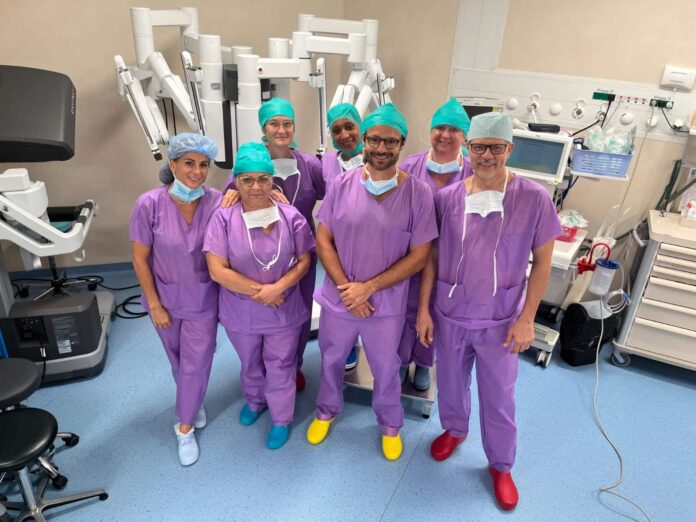The Parc Impérial Clinic, the only private emergency service in the city center of Nice, equipped itself last summer with its new Obesity Center. Outfitted with the 4th generation da Vinci X surgical robot, the team led by Professor Antonio Iannelli and Dr. Lionel Sébastianelli promises an innovative and comprehensive approach. Here is a meeting with the two surgeons.
The Parc Impérial Clinic in Nice has opened an Obesity Center that stands out due to the dual expertise of a renowned medical team and the use of the 4th generation da Vinci X surgical robot. Beyond technological performance, the center offers a “City-Hospital” care pathway to support patients before and after surgery. In this interview, Professor Antonio Iannelli and Dr. Lionel Sébastianelli, at the helm of this new service, explain the challenges of this new approach and the prospects offered to patients.
Why was it important to establish an obesity center in Nice? What specific needs does the center meet in the Nice region?
Dr. Lionel Sébastianelli : “simply because there was no obesity treatment center in the center of Nice. This center responds to a significant demand in an area that lacked this option for patients.”
Obesity is now recognized as a chronic disease. How does this recognition change the treatment approach?
Dr. Lionel Sébastianelli : “obesity is no longer seen solely as a consequence of lifestyle choices, but as a complex pathology, multifactorial, influenced by biological, psychological, and social factors. This recognition reinforces the necessity of a comprehensive approach, involving nutritionists, surgeons, psychologists, and dietitians.”
Can you concretely explain how the “City-Hospital” pathway works and why it is essential?
Prof. Antonio Iannelli : “part of the assessment is done in the city with practitioners in their offices because it is simpler. Patients already being followed by their cardiologist, psychiatrist, or dietitian continue to be, and we refer them to these same doctors. Sometimes, we integrate consultations with other specialists to get a more defined opinion, especially with psychiatrists. This allows for a more agile pathway and avoids overwhelming certain practitioners with an influx of patients.”
Beyond weight loss, what benefits do you observe in patients who undergo surgery and are well followed up?
Dr. Lionel Sébastianelli : “we very quickly notice an improvement in hypertension and cholesterol issues. Operated patients no longer experience pain when walking or climbing stairs. Weight reduction significantly relieves joints, especially the knees, hips, and back. Sleep apnea, very common in obese individuals, markedly improves or even disappears after the operation.”
Obesity surgery can sometimes be frightening. What might still worry patients, and what should reassure them here at the Parc Impérial Obesity Center?
Prof. Antonio Iannelli : “it is normal to fear surgery: it is a major surgery, with possible complications, which we now manage to minimize thanks to our extensive experience. Our team is specialized in this field and recognized for its work. We conduct many preoperative exams to not overlook a pathology that could complicate recovery. However, zero risk does not exist, of course. You also have to accept the constraints after this surgery. You can no longer eat or drink like before. We prepare patients for this, and those who come to be operated on have generally already accepted it. Many people do not go through with it because they are not ready for these sacrifices. But a dialogue with an expert surgeon greatly helps patients accept and feel confident.”
The 4th generation da Vinci X robot is a strong asset for the clinic. How does it revolutionize your surgical practice?
Prof. Antonio Iannelli: “it is an asset for the surgeons, patients, and the clinic. For us, it is more comfortable to operate, the vision is in 3D, the gestures are more precise, and we have better freedom of movement. With the robot, we can perform maneuvers that would otherwise be impossible. And there is another advantage still under scientific evaluation: patients operated on with the robot often experience less postoperative pain than those operated on without.”
Do you think robot-assisted surgery will become the norm in bariatric surgery in the coming years?
Prof. Antonio Iannelli : “yes, I hope so. The technology is rapidly developing. For now, the prices are very high, but sooner or later, they will drop as new, even more advanced robots are developed. We will all, at some point, be inclined to use a robot for surgery.”


